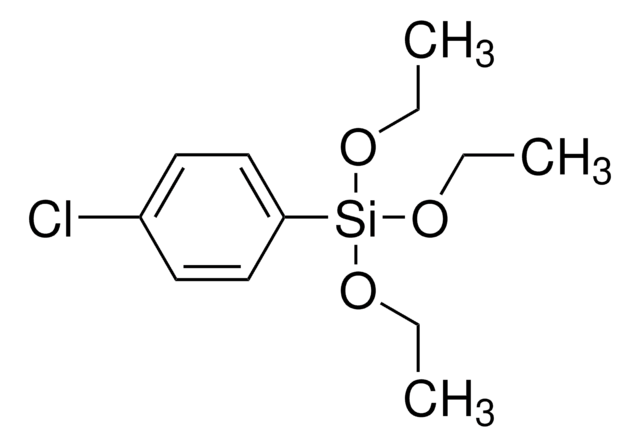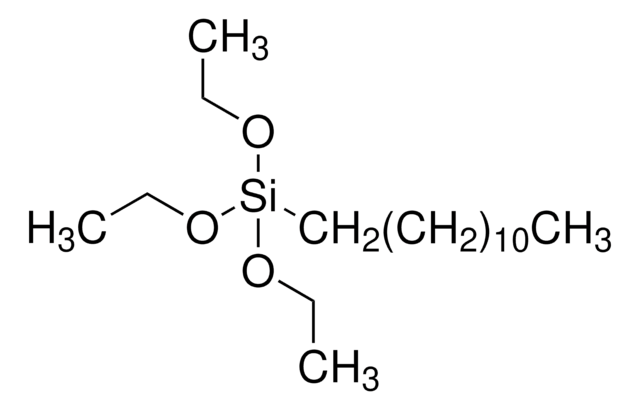50059
(3-Glycidyloxypropyl)triethoxysilane
≥97.0% (GC)
Synonym(s):
GPTES, 3-(2,3-Epoxypropyloxy)propyltriethoxysilane
Sign Into View Organizational & Contract Pricing
All Photos(1)
About This Item
Empirical Formula (Hill Notation):
C12H26O5Si
CAS Number:
Molecular Weight:
278.42
Beilstein:
144145
EC Number:
MDL number:
UNSPSC Code:
12352103
PubChem Substance ID:
NACRES:
NA.22
Recommended Products
Quality Level
Assay
≥97.0% (GC)
refractive index
n20/D 1.427
density
1.004 g/mL at 20 °C (lit.)
SMILES string
CCO[Si](CCCOCC1CO1)(OCC)OCC
InChI
1S/C12H26O5Si/c1-4-15-18(16-5-2,17-6-3)9-7-8-13-10-12-11-14-12/h12H,4-11H2,1-3H3
InChI key
JXUKBNICSRJFAP-UHFFFAOYSA-N
Looking for similar products? Visit Product Comparison Guide
Related Categories
Application
(3-Glycidyloxypropyl)triethoxysilane (GPTES) can be used as a reagent in the synthesis of:
GPTES can also be used as a precursor to prepare water-repellent, self-cleaning coatings.
- Polymer nanocomposite membranes for direct methanol fuel cells (DMFCs).
- Azido terminated poly(ethylene glycol) silane that can be self-assembled on a metal-oxide surface to facilitate the orthogonal biofunctionalization.
- Epoxy functionalized silsesquioxane nanoparticles (SQ-NPs).
- Epoxy-functionalized mesoporous cellular foams (G-MCFs) as the support for the immobilization of penicillin G acylase (PGA).
GPTES can also be used as a precursor to prepare water-repellent, self-cleaning coatings.
Signal Word
Warning
Hazard Statements
Precautionary Statements
Hazard Classifications
Acute Tox. 4 Inhalation - Eye Irrit. 2 - Skin Irrit. 2 - STOT SE 3
Target Organs
Respiratory system
Storage Class Code
10 - Combustible liquids
WGK
WGK 3
Flash Point(F)
291.2 °F
Flash Point(C)
144 °C
Personal Protective Equipment
dust mask type N95 (US), Eyeshields, Gloves
Choose from one of the most recent versions:
Already Own This Product?
Find documentation for the products that you have recently purchased in the Document Library.
Customers Also Viewed
Polymer nanocomposite membranes for DMFC application.
Karthikeyan C S, et al.
Journal of Membrane Science, 254(1-2), 139-146 (2005)
Synthesis and metal complexation of dual-functionalized silsesquioxane nanoparticles by sequential thiol-epoxy click and esterification reactions
Shibasaki S, et al.
Reactive and Functional Polymers, 107, 11-19 (2016)
W Schössler et al.
Biomaterials, artificial cells, and artificial organs, 18(5), 657-663 (1990-01-01)
Since several years matrix-bound biologically active substances are widely used in biosciences, biotechnology and medicine. We are presenting a simple and inexpensive activation procedure for support materials which allows stable binding of C1q and DNA. We could not found a
Orthogonal biofunctionalization of magnetic nanoparticles via ?clickable? poly (ethylene glycol) silanes: a ?universal ligand? strategy to design stealth and target-specific nanocarriers.
Das M, et al.
J. Mater. Sci., 22(47), 24652-24667 (2012)
A novel organic/inorganic polymer membrane based on poly (vinyl alcohol)/poly (2-acrylamido-2-methyl-1-propanesulfonic acid/3-glycidyloxypropyl trimethoxysilane polymer electrolyte membrane for direct methanol fuel cells
Yang C-C, et al.
Journal of Power Sources, 196(10), 4458-4467 (2011)
Our team of scientists has experience in all areas of research including Life Science, Material Science, Chemical Synthesis, Chromatography, Analytical and many others.
Contact Technical Service




![Trimethoxy[2-(7-oxabicyclo[4.1.0]hept-3-yl)ethyl]silane 98%](/deepweb/assets/sigmaaldrich/product/structures/181/139/6e4db31d-004b-403d-9456-b5b3ef912834/640/6e4db31d-004b-403d-9456-b5b3ef912834.png)



![[3-(2,3-Epoxypropoxy)-propyl]-trimethoxysilane for synthesis](/deepweb/assets/sigmaaldrich/product/images/156/055/2b7a2b4c-aca4-46e8-a055-64313c26c699/640/2b7a2b4c-aca4-46e8-a055-64313c26c699.jpg)




